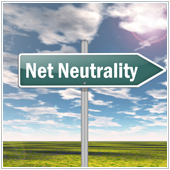 One of the most popular tech related themes many news outlets are reporting on these days is the ‘net neutrality’. Over the past month or two it has become one of the biggest hot-button topics. While net neutrality is fairly important for anyone who uses the Internet today, so few people are actually aware of what it is and the main issue surrounding it.
One of the most popular tech related themes many news outlets are reporting on these days is the ‘net neutrality’. Over the past month or two it has become one of the biggest hot-button topics. While net neutrality is fairly important for anyone who uses the Internet today, so few people are actually aware of what it is and the main issue surrounding it.
What is net neutrality?
Without the Internet, modern society would undoubtedly grind to a halt. Think of the last time the Internet was down. How did your employees react? If they are like most everyone else, they probably were at a loss as to what to do.
The Internet was first created to be a kind of forum where people could have access to any information they needed. This open format is what defines the Internet, and Tim Wu, a Professor at Columbia Law School came up with a term to describe this phenomenon – net neutrality.
Net neutrality is the concept that the Internet is an open place, where all websites and services regardless of their size and popularity are equal, and should be equally accessible as long as the content they contain is legally allowed.
What is the problem?
At the moment, the Internet is open, meaning you are able to access every legal website. But it appears as if this could be changing, in the US at least. In early May of this year, the FCC (Federal Communications Commission) released a potential bill for public comment whereby Internet Service Providers would be able to charge Internet based companies for faster access to their sites. For example, an ISP could go to Facebook and tell the social media site that if they pay then the ISP will speed up the connection speed for the service, allowing users faster access.
What this would do, is essentially violate net neutrality; allowing companies who can pay the fees demanded by the ISPs an advantage over those who don’t have access to the same funds. Think of it this way: If a website is slow to load, people will go to another similar service that is quicker. In the future, the reason this second service is quicker could be because payment has been made to an ISP so the site is delivered faster to users who are connected to the net using that service.
What this could equate to is an unfair advantage for some companies, especially larger ones with access to greater funds. That being said, it is important to stress that this idea is just at the proposal stage and will need approval from the US Government before it can be enacted.
How does this affect my company?
At the moment, there is little you need to be worried about. However, if there is a change in law then you will need to know how the different ISPs plan to charge customers for access speeds.
If your business is outside of the US, there is probably not a lot you have to worry about for the time being, as this law will only apply to sites and ISPs in the US. Of course, US based ISPs have massive influence on ISPs in other countries and what they do is often mirrored globally.
Regardless of your location, what you can do for now is follow the news. The FCC has the current proposal out for public review until September 2014, and then there may be a move forward to getting it approved. Watch this space!